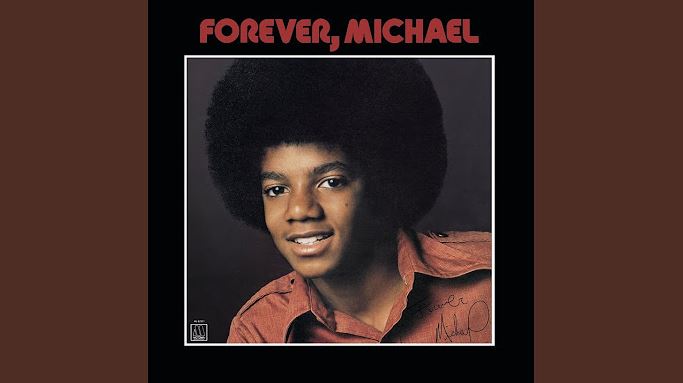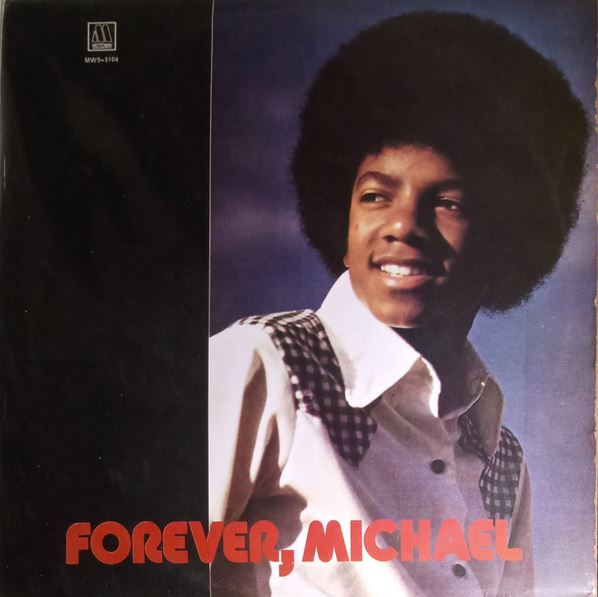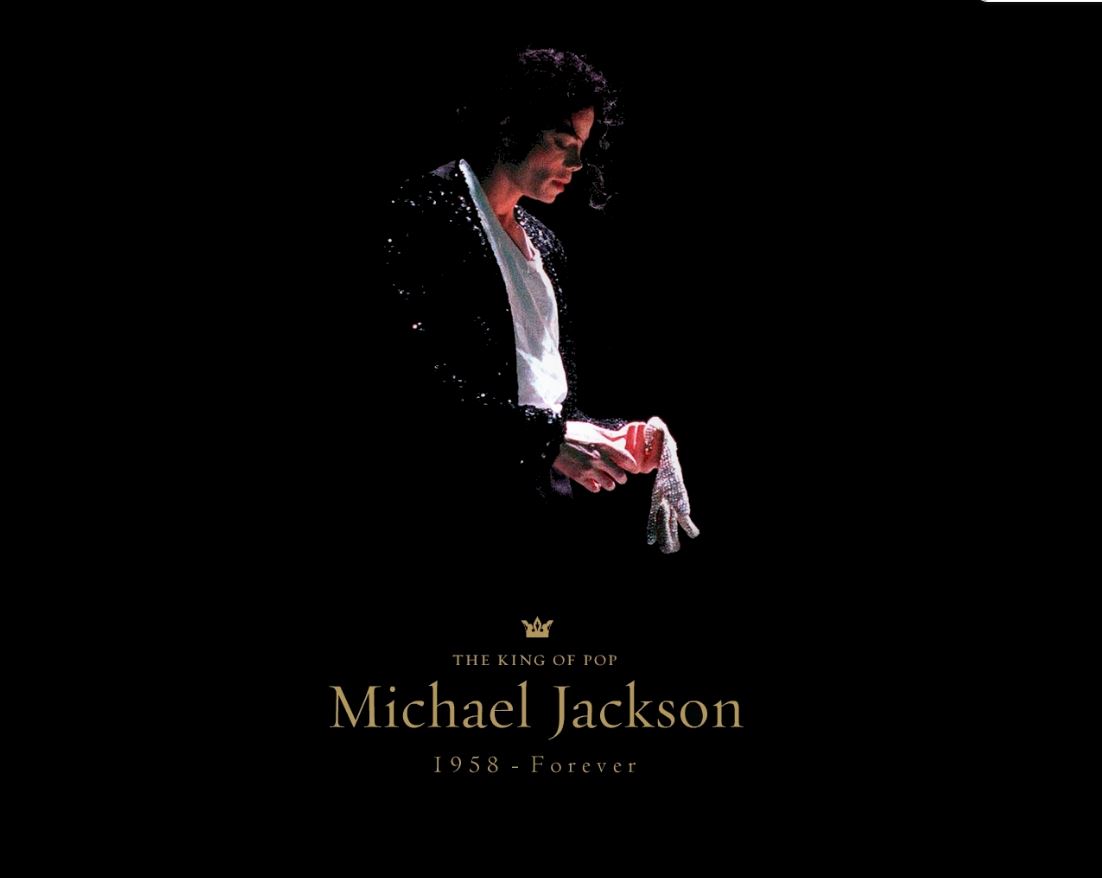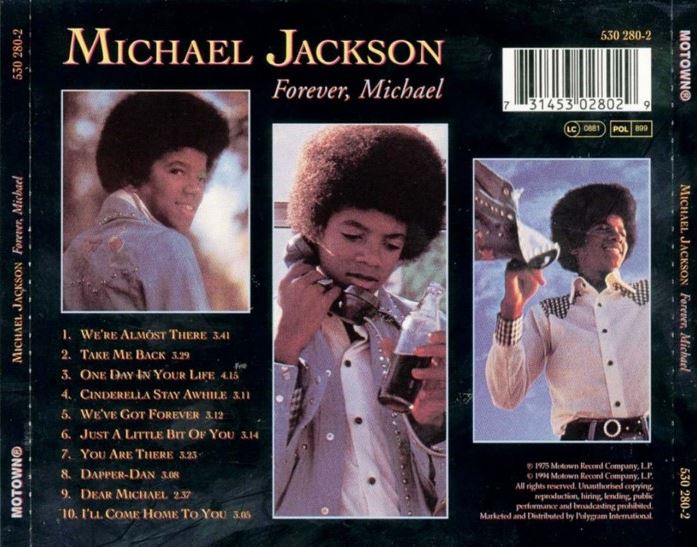“Forever, Michael,” released on January 16, 1975, marks a significant chapter in the illustrious career of Michael Jackson. This album, his fourth studio effort, was released under the Motown Records label, during a period of transition both for the artist and the music industry. At just 16 years old, Jackson was gradually shifting from the bubblegum pop sound that had characterized his earlier releases to a more mature sound infused with soul and funk elements.
Produced by a talented ensemble including Eddie Holland, Brian Holland, Hal Davis, Freddie Perren, and Sam Brown III, “Forever, Michael” showcased a departure from the typical Motown pop formula. The album’s sound was a blend of lush ballads and mid-tempo tracks, setting the stage for Jackson’s future musical explorations. Despite its innovative approach, the album did not achieve significant commercial success worldwide. It charted modestly in the United States, peaking at number 101 on the Billboard Top LPs & Tape chart and reaching number 10 on the Billboard Top Soul Albums chart. Internationally, it failed to make a significant impact.
Critically, “Forever, Michael” received a mixed to positive reception. While it did not garner the acclaim or the sales figures of Jackson’s future works, it was generally well-received by music critics who appreciated the young artist’s vocal maturation and the quality of the production. The album represented a crucial stepping stone in Jackson’s transition from child star to a global pop phenomenon. It encapsulated a phase of his career filled with both experimentation and the promise of greater achievements, which would be fully realized in his subsequent albums. “Forever, Michael” remains an important, albeit often overlooked, piece of Michael Jackson’s vast musical legacy, offering fans and critics alike a glimpse into the developmental stages of a superstar’s career.
| Album Title | Forever, Michael |
|---|---|
| Release Date | January 16, 1975 |
| Label | Motown Records |
| Artist’s Age at Release | 16 years old |
| Key Producers | Eddie Holland, Brian Holland, Hal Davis, Freddie Perren, Sam Brown III |
| Sound Style | Soul and funk elements, departure from Motown pop |
| US Chart Performance | Peaked at #101 on Billboard Top LPs & Tape, #10 on Billboard Top Soul Albums |
| International Impact | Minimal |
| Critical Reception | Mixed to positive, noted for vocal maturation and production quality |
| Significance | Transition from child star to global pop phenomenon, experimental phase |
Contents
Background
By the time “Forever, Michael” was released in 1975, Michael Jackson was already a seasoned performer, despite being only 16 years old. He had experienced considerable success with the Jackson 5, a group managed by Motown Records that catapulted him and his brothers to stardom in the late 1960s and early 1970s. This album marked his fourth solo effort under the Motown banner, but it was set against a backdrop of significant changes both in his personal artistic journey and in his contractual obligations with record labels.
The release of “Forever, Michael” came at a pivotal time when Jackson was beginning to seek more creative control over his music. Frustrations with Motown’s tight control over the artistic direction of their artists were growing, particularly among the Jacksons, who felt stifled by the inability to write their own music and produce their albums. This growing discontent would eventually lead Michael and his brothers to leave Motown for CBS Records in 1975, shortly after the album’s release. This move was significant as it symbolized a break from the assembly-line style of music production that Motown had perfected, and it allowed Jackson more artistic freedom, which was crucial for his development as a solo artist.

The transition also coincided with a noticeable evolution in Jackson’s musical style and vocal presentation. Moving away from the high-pitched vocals of his youth, “Forever, Michael” featured a tenor voice that was richer and more mature. This change was not just a natural consequence of aging; it also reflected his growing capability and comfort with more complex musical expressions. The album was a clear departure from the pop-centric sounds of earlier albums, introducing a smoother soul sound mixed with funk elements, setting the stage for his future musical explorations.
| Album Title | Forever, Michael |
|---|---|
| Release Date | 1975 |
| Artist’s Age | 16 years old |
| Previous Success | Success with Jackson 5 under Motown Records |
| Album Number | Fourth solo album |
| Contractual Changes | Departure from Motown to CBS Records shortly after the album’s release |
| Reasons for Change | Frustration with lack of creative control at Motown |
| Vocal Style Evolution | Transition from high-pitched vocals to a richer, tenor voice |
| Sound Style | Introduction of smoother soul sound mixed with funk elements |
| Significance of Change | Allowed for more artistic freedom and complex musical expressions |
Video Album Overview
“Forever, Michael” stands out in Michael Jackson’s early discography for its distinct blend of soul, pop, and funk. The album’s style was a bridge between the Motown sound of his early years with the Jackson 5 and the more innovative and genre-defying music he would produce later. This blend was carefully crafted by a team of seasoned producers, including Eddie Holland, Brian Holland, Hal Davis, Freddie Perren, and Sam Brown III. Each brought a unique element to the album, from classic Motown arrangements to contemporary soul rhythms, which enriched the overall sound.
The thematic content of “Forever, Michael” reflected a transition in Jackson’s lyrical focus as well. Moving away from the predominantly love-centric themes of his previous albums, this record explored more varied emotional depths and complexities, a sign of his maturing as both a person and an artist. Songs like “One Day in Your Life” exemplify this maturity, with lyrics that express a reflective and introspective depth, suggesting a nostalgia and emotional complexity beyond his years.
The producers played a pivotal role in shaping the sound of the album. Freddie Perren and the team of Holland-Dozier-Holland, known for their definitive work during the Motown golden era, infused the album with a mix of contemporary and classic soul elements that were both fresh yet familiar to fans of Jackson’s earlier work. Hal Davis, another key figure, contributed to the soft ballad textures that complemented Jackson’s evolving vocal style. The collaboration of these producers under the Motown umbrella ensured that while the album bore the hallmarks of Jackson’s emerging artistic identity, it still maintained commercial viability through its palatable soul and funk rhythms.
In essence, “Forever, Michael” was a crucial juncture in Michael Jackson’s career, capturing the essence of his transition from a child star into a more autonomous, musically sophisticated artist. It laid the groundwork for his subsequent breakthroughs, which would transform him into one of the most iconic figures in the history of popular music.
| Album Title | Forever, Michael |
|---|---|
| Release Context | Bridge between early Motown sound and later innovative styles |
| Key Producers | Eddie Holland, Brian Holland, Hal Davis, Freddie Perren, Sam Brown III |
| Production Style | Blend of soul, pop, and funk; mix of classic Motown and contemporary soul rhythms |
| Thematic Content | Transition from love-centric themes to exploring emotional depth and complexity |
| Example Song | “One Day in Your Life” – Reflective, introspective, and emotionally complex |
| Producers’ Contributions | Classic Motown arrangements, contemporary soul rhythms, soft ballad textures |
| Album’s Significance | Marked Michael’s transition from child star to musically sophisticated artist |
| Impact on Career | Laid groundwork for breakthroughs, transforming him into a global music icon |
Promotion and Release
The release of “Forever, Michael” was strategically planned by Motown Records to capitalize on Michael Jackson’s rising star. The promotional strategies employed for this album were multifaceted, focusing on both traditional and innovative marketing techniques to maximize its visibility and appeal. The promotional efforts were particularly noteworthy for their timing and coordination with the release of the Jackson 5’s album “Moving Violation.” This dual promotion not only leveraged Michael Jackson’s popularity but also highlighted the talent present in the family as a whole, creating a comprehensive marketing narrative that appealed to a broad audience.

Three singles were released from “Forever, Michael,” each chosen to showcase different facets of Jackson’s evolving musical style. “We’re Almost There” and “Just a Little Bit of You” both reached respectable positions on the US Billboard Hot 100, peaking at numbers 54 and 23 respectively. These singles performed even better on the R&B charts, indicating Jackson’s strong resonance with soul and R&B audiences. The third single, “One Day in Your Life,” although not initially making a significant impact in the United States, would later become a posthumous hit internationally, particularly in the UK where it reached number one in 1981.
The joint promotional campaign with “Moving Violation” was a significant aspect of the album’s release strategy. This combined promotional effort was designed to synergize the appeal of both Michael’s solo project and the Jackson 5’s group effort, thereby maximizing the exposure across multiple audience segments. The campaign included extensive touring, television appearances, and merchandise that featured both Michael’s solo work and the Jackson 5’s contributions, creating a comprehensive marketing push that was quite effective domestically.
| Album Title | Forever, Michael |
|---|---|
| Promotional Context | Coordinated with release of Jackson 5’s “Moving Violation” |
| Marketing Strategy | Traditional and innovative techniques, dual promotion with Jackson 5 |
| Singles Released | “We’re Almost There”, “Just a Little Bit of You”, “One Day in Your Life” |
| Billboard Hot 100 Performance | “We’re Almost There” (No. 54), “Just a Little Bit of You” (No. 23) |
| R&B Chart Performance | Strong performance, indicating resonance with soul and R&B audiences |
| International Success | “One Day in Your Life” became a posthumous hit, No. 1 in the UK (1981) |
| Campaign Features | Extensive touring, TV appearances, merchandise featuring Michael and Jackson 5 |
| Impact of Promotional Efforts | Effective marketing push, maximizing exposure across multiple audience segments |
Critical Reception
Upon its release, “Forever, Michael” received a mixed to positive critical reception. While it did not achieve the overwhelming commercial success of Jackson’s later works, it was generally well-received by music critics who appreciated the artistic growth it represented. Robert Christgau of “The Village Voice” gave the album an A− rating, praising Jackson’s vocal maturity and the production quality. He noted that at 16, Michael’s voice effectively balanced “autonomy and helpless innocence,” a combination that lent a unique charm to the album.
Other reviews, such as those from “AllMusic” and “Entertainment Weekly,” were more measured but still recognized the album’s importance in Jackson’s career trajectory. “AllMusic” editor William Ruhlmann remarked that “Forever, Michael” was a more mature effort from the young artist but lacked the innovative dance style that would later define his career. Leah Greenblatt of “Entertainment Weekly” commented on the album’s “comparatively adult soul sound,” acknowledging it as a stepping stone away from Jackson’s early pop image.

In retrospect, “Forever, Michael” is often seen as an important transitional album in Michael Jackson’s discography. It bridges the gap between his early Motown recordings and his breakout as a global superstar with “Off the Wall.” The album is appreciated for its lush production and the way it hints at Jackson’s future musical direction. Although it does not stand out as one of his most commercially successful albums, it is critically acknowledged for showcasing his growing abilities and the potential that would soon be fully realized.
In summary, “Forever, Michael” occupies a unique place in Michael Jackson’s discography. It captures a moment of change, where the young artist was beginning to find his voice and artistic direction, setting the stage for the monumental success he would achieve in the following years. Its critical reception, both at the time of release and in subsequent years, reflects an appreciation for this pivotal period in Jackson’s career.
| Album Title | Forever, Michael |
|---|---|
| Critical Reception | Mixed to positive |
| Notable Review | Robert Christgau, A− rating; praised vocal maturity and production quality |
| Key Critical Insights |
|
| Album’s Role | Transitional; bridges early Motown recordings and breakout with “Off the Wall” |
| Production Appreciation | Lush production and hints at future musical direction |
| Commercial Success | Not as high as later albums but important for artistic growth |
| Historical Significance | Captures a moment of change; pivotal in setting the stage for future success |
Track-by-Track Analysis
“Forever, Michael” presents a collection of tracks that not only highlight Michael Jackson’s evolving artistry but also the craftsmanship of some of Motown’s best producers and songwriters. Here’s a closer look at several key tracks:

- “We’re Almost There” (Eddie Holland, Brian Holland): This track opens with a lush orchestral arrangement, setting a tone of optimistic perseverance. Produced by Brian Holland, it features a compelling vocal performance from Jackson, whose maturity shines through the soulful delivery. The song reached No. 54 on the Billboard Hot 100, showing modest commercial success.
- “Take Me Back” (Eddie Holland, Brian Holland): Another Holland brothers creation, this song is a nostalgic plea, blending R&B rhythms with emotional lyrics. The production encapsulates the classic Motown sound, with a modern twist that suits Jackson’s vocal transition from boy soprano to tenor.
- “One Day in Your Life” (Sam Brown III, Renée Armand): Arguably the most memorable track on the album, it later became a significant hit posthumously. The ballad’s sweeping orchestral arrangement and poignant lyrics speak of remembering a past love. It showcases Jackson’s ability to convey deep emotion, a trait that would define many of his later hits.
- “Cinderella Stay Awhile” (Mack David, Michael Burnett Sutton): This track features a fairy-tale-like storytelling, enhanced by a soft, melodic arrangement. It is a testament to Jackson’s ability to handle gentle, romantic themes, which would become more prevalent in his later works.
- “Just a Little Bit of You” (Eddie Holland, Brian Holland): Upbeat and vibrant, this song reflects the classic Motown vibe with a contemporary edge, propelled by Jackson’s energetic delivery. It reached No. 23 on the Billboard Hot 100, making it one of the more successful singles from the album.
Each track on “Forever, Michael” not only serves as a showcase for Jackson’s vocal talents but also highlights the intricate work of its producers, who crafted a sound that was both true to the Motown style and forward-looking in its appeal.
| Track Title | Key Songwriters | Description | Billboard Hot 100 Peak |
|---|---|---|---|
| “We’re Almost There” | Eddie Holland, Brian Holland | Lush orchestral arrangement, optimistic perseverance theme, showcases vocal maturity | No. 54 |
| “Take Me Back” | Eddie Holland, Brian Holland | Nostalgic, blends R&B rhythms with emotional lyrics, classic Motown sound with a modern twist | – |
| “One Day in Your Life” | Sam Brown III, Renée Armand | Ballad with sweeping orchestral arrangement, poignant lyrics about past love, became a posthumous hit | Posthumous No. 1 in UK (1981) |
| “Cinderella Stay Awhile” | Mack David, Michael Burnett Sutton | Fairy-tale-like storytelling, soft melodic arrangement, romantic themes | – |
| “Just a Little Bit of You” | Eddie Holland, Brian Holland | Upbeat, reflects classic Motown vibe with a contemporary edge, energetic delivery | No. 23 |
Commercial Performance
“Forever, Michael” experienced modest commercial success, particularly in the United States. It peaked at number 101 on the Billboard Top LPs & Tape chart and reached number 10 on the Billboard Top Soul Albums chart. These figures reflect a lukewarm reception in the broader market but a stronger connection with soul and R&B audiences.
Internationally, the album did not chart, which was indicative of Jackson’s yet-to-be-established global presence at the time. The singles, while moderately successful in the U.S., did not make significant inroads overseas until much later, notably with “One Day in Your Life” becoming a hit several years after its initial release.
The overall sales figures for “Forever, Michael” are estimated at around 1 million copies worldwide. This number is relatively modest compared to the astronomical sales Jackson would achieve with later albums like “Thriller” and “Bad.” The commercial performance of “Forever, Michael” illustrates a transitional phase in Jackson’s career, where he had not yet fully tapped into the global market that would later embrace him as a pop icon.

In summary, “Forever, Michael” serves as an important marker in Michael Jackson’s musical journey, bridging his early teen idol days at Motown with his emergence as a mature solo artist. While not as commercially successful as his subsequent releases, the album’s tracks display a growing complexity and depth, both in musical style and lyrical content, setting the stage for the groundbreaking works that would follow. The album remains a critical piece of the Jackson legacy, offering insights into his artistic development and the evolution of his voice and musical direction.
| Album Title | Forever, Michael |
|---|---|
| US Chart Performance | Peaked at No. 101 on Billboard Top LPs & Tape, No. 10 on Billboard Top Soul Albums |
| International Chart Performance | Did not chart |
| Significant Singles | “One Day in Your Life” became a hit years later, especially in the UK |
| Estimated Worldwide Sales | Approximately 1 million copies |
| Comparative Sales | Modest compared to later albums like “Thriller” and “Bad” |
| Career Phase | Transitional phase; not yet established globally |
| Album’s Role | Bridging early teen idol days with emergence as a mature solo artist |
| Artistic Significance | Shows growing complexity in musical style and lyrical content |
| Legacy | Important for understanding Jackson’s artistic development and evolution |
Legacy and Reissues
“Forever, Michael” occupies a unique place in Michael Jackson’s illustrious career. Released as his final album under the Motown label, it captures a transitional moment, reflecting both the end of his early phase as a teen idol and the beginning of his maturation into a more versatile and profound artist. This album is often overlooked when compared to his later monumental works; however, it remains a critical stepping stone that foreshadowed the innovative artist Jackson was to become.
The significance of “Forever, Michael” in Jackson’s discography has been cemented through various reissues and the inclusion of its tracks in several compilation albums over the years. Notably, the song “One Day in Your Life” became the centerpiece of a 1981 compilation album of the same name, which achieved considerable success, particularly in the UK where it topped the charts. This resurgence highlighted the enduring appeal of Jackson’s early work.

Following Michael Jackson’s death in June 2009, there was a renewed interest in all facets of his music, including “Forever, Michael.” Fans and new listeners alike revisited the album, seeking to understand the evolution of this phenomenal artist from his early days. The album’s tracks were included in the comprehensive “Hello World: The Motown Solo Collection,” a three-disc compilation that provided a complete overview of Jackson’s Motown years. This collection helped new generations appreciate the depth and variety of Jackson’s early work, ensuring that “Forever, Michael” continued to receive the recognition it deserves.
| Album Title | Forever, Michael |
|---|---|
| Release Context | Final album under Motown label; marks transition from teen idol to mature artist |
| Underappreciated Role | Often overlooked but critical stepping stone in his career |
| Reissues and Compilations | Tracks included in various reissues and compilations, highlighting ongoing relevance |
| Notable Compilation | “One Day in Your Life” compilation (1981); topped UK charts, showcasing enduring appeal |
| Posthumous Interest | Renewed interest following Jackson’s death in June 2009 |
| Comprehensive Collection | Featured in “Hello World: The Motown Solo Collection,” offering a complete overview of Motown years |
| Legacy Impact | Helps new generations appreciate the depth and variety of Jackson’s early work |
| Recognition | Continues to receive recognition for its role in shaping Jackson’s artistic evolution |
“Forever, Michael” significantly impacted Michael Jackson’s early career. Although it did not achieve the blockbuster status of his later albums, it was a critical artistic development phase, showcasing his growing ability to convey more mature themes and emotions through music. The album’s mix of soulful ballads and upbeat tracks highlighted Jackson’s versatility and hinted at the future direction his music would take.
The long-term significance of “Forever, Michael” cannot be overstated. While it might not stand out in terms of commercial success, it was instrumental in paving the way for Jackson’s future achievements. The artistic explorations and vocal maturity displayed on this album laid the groundwork for his breakthrough with “Off the Wall,” where he would fully realize his potential and redefine pop music. “Forever, Michael” serves as a reminder of Jackson’s artistic growth, showcasing how he transitioned from a Motown prodigy to a global superstar.
In retrospect, “Forever, Michael” is more than just an album; it is a pivotal chapter in the story of Michael Jackson’s career. It represents a young artist on the brink of discovering his unique voice and vision, poised to change the music landscape forever. Through this album, listeners can trace the beginnings of Jackson’s evolution into the King of Pop—a testament to his enduring legacy in the world of music.

